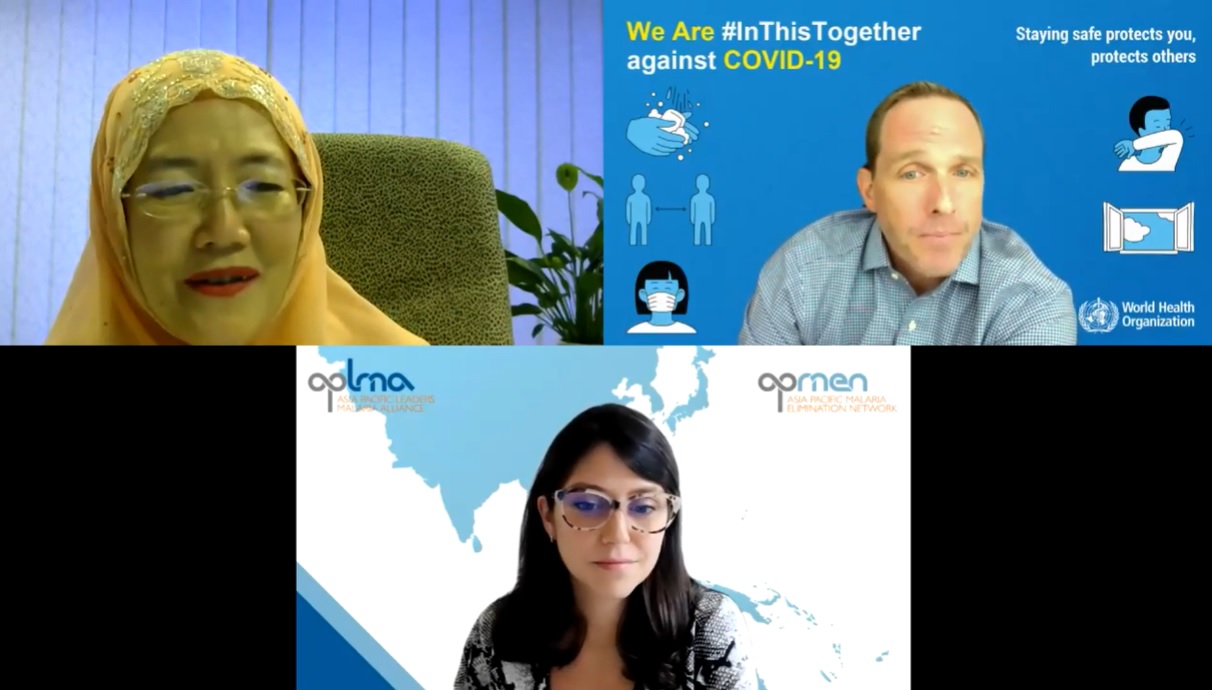
COVID-19 has placed a strain on health systems globally. Last March 2020, APMEN held a session at an early stage in the pandemic, where we explored how countries in the Asia Pacific region were going about sustaining malaria services despite the nascent health crisis of COVID-19. A year on, as we are still very much dealing with the pandemic and rolling out the vaccine progressively, we take stock on the region’s ongoing challenges and successes in keeping malaria under check.
We dedicated this APMENxChange webinar to explore how near elimination country – Malaysia sustained zero indigenous case despite the pandemic. This session was attended by 97 policy makers and implementers from government and non-government organizations, colleagues from donor, UN and private sectors and experts from academic and research institutions from across the world to learn from Malaysia and other countries in Asia Pacific on how they have been adapting malaria interventions to emerging health challenges and keeping malaria services on track as they strive to achieve their elimination targets.
Reflecting on Dr Rose’s presentation and the rich inputs received from the attendees through the interactive session on mentimeter, three important points were learnt -
-
Sustained leadership and political commitment
Now more than ever before, leaders’ support of the malaria elimination goal is critical. Special arrangements are needed to issued Movement Control Orders (or MCOs) as was the case in Malaysia. In addition, communities should be empowered to continue their work safely, with the right Personal Protective Equipment.
-
Sustained financing for elimination
The pandemic will inevitably have an impact on economies globally, but we all, including APLMA-APMEN should continue to advocate for government and external funders to sustain investments in Malaria. We have seen how investing in malaria, in Community Health Workers for example, has also helped tackle the pandemic among the most vulnerable, by improving access to basic health services.
-
Information innovation and integration
As we approach elimination and target our surveillance systems, making malaria notifiable means we can ensure we catch every last case. We need to keep up active surveillance for malaria by gathering real time data through standardised Dashboard, even during COVID-19. To adapt, we also need to innovate, change up our strategies, adapt them by zone and eventually integrate malaria surveillance within the broader health system.
The published papers we shared during webinar are -
-
RBM, MOH Malaysia, APLMA, APMEN (2020) Malaysia Case Study
-
Vanuatu (2021) Op-Ed: Vanuatu leading the way on Malaria Elimination in the Pacific
-
WHO (2020) Maintaining essential health services: operational guidance for the COVID-19 context: interim guidance, 1 June 2020
-
WHO (2021) Second round of the national pulse survey on continuity of essential health services during the COVID-19 pandemic, 23 April 2021
The recorded video can be viewed here.
We would like to extend a special thanks to our panellist Dr Rose Nani Mudin, Deputy Director Communicable Disease from Disease Control Division, Ministry of Health Malaysia, and Facilitator for this session Dr James Kelley, Technical Officer - Malaria Surveillance & Elimination from Malaria & Neglected Tropical Diseases Unit, WHO Western Pacific Regional office.
